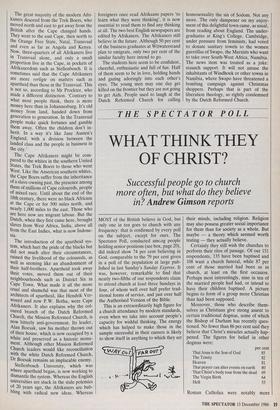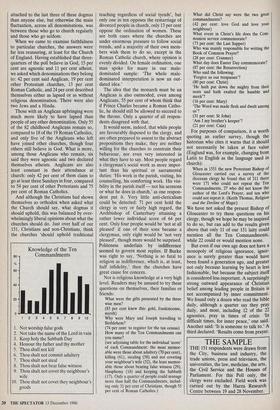THE SPECTATOR POLL
WHAT THINK THEY OF CHRIST?
Successful people go to church more often, but what do they believe
in? Andrew Gimson reports MOST of the British believe in God, but only one in ten goes to church with any frequency: that is confirmed by every poll on the subject, except for ours. The Spectator Poll, conducted among people holding senior positions (see box, page 20), did indeed show 74 per cent believing in God, comparable to the 79 per cent given in a poll of the population at large pub- lished in last Sunday's Sunday Express. It was, however, remarkable to find that nearly two-fifths of our respondents claim to attend church at least three Sundays in four, of whom well over half prefer trad- itional forms of service, and just over half the Authorised Version of the Bible.
This is an extraordinarily high figure for a church attendance by modern standards, even when we take into account people's capacity for wishful thinking. The energy which has helped to make those in the sample successful in their careers is likely to show itself in anything to which they set their minds, including religion. Religion may also possess greater social importance for them than for society as a whole. But maybe — a theory which seemed worth testing — they actually believe.
Certainly they still wish the churches to perform their rites of passage. Of our 151 respondents, 135 have been baptised and 108 want a church funeral, while 87 per cent of those married had been so in church, at least on the first occasion. Perhaps most interestingly, nine in ten of the married people had had, or intend to have their children baptised. A picture begins to form of a group more Christian than had been supposed.
Moreover, those who describe them- selves as Christians give strong assent to certain traditional dogmas, some of which the Bishop of Durham has recently ques- tioned. No fewer than 86 per cent said they believe that Christ's miracles actually hap- pened. The figures for belief in other dogmas were:
per cent That Jesus is the Son of God 85 The Trinity 82 Heaven 81 That prayer can alter events on earth 80 That Christ's body rose from the dead 69 The Virgin Birth 64 Hell 55
Roman Catholics were notably more attached to the last three of these dogmas than anyone else, but otherwise the main fluctuation, across all denominations, was between those who go to church regularly and those who go seldom.
When we came to examine faithfulness to particular churches, the answers were far less reassuring, at least for the Church of England. Having established that three- quarters of the poll believe in God, 15 per cent are agnostic and 11 per cent atheist, we asked which denominations they belong to: 42 per cent said Anglican, 19 per cent other Protestant churches, 13 per cent Roman Catholic, and 24 per cent described themselves either as lapsed or as without religious denomination. There were also two Jews and a Hindu.
Those with an Anglican upbringing were much more likely to have lapsed than people of any other denomination. Only 55 of the 82 childhood Anglicans remain so, compared to 18 of the 19 Roman Catholics, and only five of the Anglicans who left have joined other churches, though four others still believe in God. What is more, among those Anglicans who remain, six said they were agnostic and two declared themselves atheists. Anglicans are also least constant in their attendance at church: only 42 per cent of them claim to go at least three Sundays in four, compared to 54 per cent of other Protestants and 75 per cent of Roman Catholics.
And although the Christians had shown themselves so orthodox when asked what the Church should say, what dogmas it should uphold, this was balanced by over- whelmingly liberal opinions about what the churches should do. Just over half of our 151, Christians and non-Christians, think the churches 'should uphold traditional 1. Not worship false gods 2. Not take the name of the Lord in vain 3. Keep holy the Sabbath Day 4. Honour thy father and thy mother 5. Thou shall not kill 6. Thou shalt not commit adultery 7. Thou shalt not steal 8. Thou shalt not bear false witness 9. Thou shalt not covet thy neighbour's wife 10. Thou shalt not covet they neighbour's goods teaching regardless of social trends', but only one in ten opposes the remarriage of divorced people in church, only 13 per cent oppose the ordination of women. These are both cases where the churches are under enormous pressure to follow social trends, and a majority of their own mem- bers wish them to do so, except in the Roman Catholic church, where opinion is evenly divided. On female ordination, one man spoke for many in our male- dominated sample: 'The whole male- dominated interpretation is now an out- dated idea.'
The idea that the monarch must be an Anglican is also outmoded, even among Anglicans, 55 per cent of whom think that if Prince Charles became a Roman Catho- lic, he should still be allowed to succeed to the throne. Only a quarter of all respon- dents disagreed with that.
It would seem, indeed, that while people are favourably disposed to the clergy, and are often prepared to assent to the abstract propositions they make, they are neither willing for the churches to constrain their behaviour, nor even very interested in what they have to say. Most people regard a clergyman's social work as more impor- tant than his spiritual or sacramental duties: 'His work in the parish, visiting, his counselling, his comforting work. His visi- bility in the parish itself not his sermons or what he does in church,' as one respon- dent put it. Very little anti-clericalism could be detected: 71 per cent hold the clergy in very or fairly high regard, the Archbishop of Canterbury attaining a rather lower individual score of 64 per cent. Only four people would be 'not at all pleased' if one of their sons became a clergyman, only eight would be 'not very pleased', though more would be surprised. Politeness underlain by indifference seemed to govern most replies. If Burke was right to say, 'Nothing is so fatal to religion as indifference, which is, at least, half infidelity,' then the churches have great cause for concern.
Nor is religious knowledge at a very high level. Readers may be amused to try these questions on themselves, their families or friends:
What were the gifts presented by the three wise men?
(83 per cent knew this: gold, frankincense, myrrh) Why were Mary and Joseph travelling to Bethlehem?
(74 per cent: to register for the tax census) How many of the Ten Commandments can you name?
(see adjoining table for the individual 'score' of each Commandment: the most memor- able were those about adultery (70 per cent), killing (61), stealing (58) and not coveting your neighbour's wife (52), the least memor- able those about bearing false witness (29), blasphemy (18) and keeping the Sabbath (17). Only a quarter of people could manage more than half the Commandments, includ- ing only 31 per cent of Christians, though 55 per cent of Roman Catholics.)
What did Christ say were the two great commandments?
(42 per cent: love God and love your neighbour) What event in Christ's life does the Com- munion service commemorate?
(73 per cent: the Last Supper) Who was mainly responsible for writing the Book of Common Prayer?
(28 per cent: Cranmer) What day does Easter Day commemorate? (87 per cent: the Resurrection) Who said the following: 'Forgive us our trespasses'?
(80 per cent: Christ)
'He hath put down the mighty from their seats and hath exalted the humble and meek'?
(16 per cent: Mary) The Word was made flesh and dwelt among us'?
(31 per cent: St John) 'Am I my brother's keeper'?
(21 per cent: Cain)
For purposes of comparison, it is worth quoting an earlier survey, though the historian who cites it warns that it should not necessarily be taken at face value (England was, for example, changing from Latin to English as the language used in church): When in 1551 the new Protestant Bishop of Gloucester carried out a survey of the diocesan clergy he found that of 311 there were 171 who could not repeat the Ten Commandments, 27 who did not know the author of the Lord's Prayer, and ten who could not repeat it. (Keith Thomas, Religion and the Decline of Magic) We have not asked the present Bishop of Gloucester to try these questions on his clergy, though we hope he may be inspired to do so, but can add to the results given above that only 11 of our 151 laity could mention all the Ten Commandments, while 22 could or would mention none.
But even if our own age does not have a monopoly of religious ignorance, ignor- ance is surely greater than would have been found a generation ago, and greater not only because learning by heart is less fashionable, but because the subject itself is considered less important. A surprisingly strong outward appearance of Christian belief among leading people in Britain is not accompanied by inner commitment. We found only a dozen who read the bible daily, although a quarter say they pray daily, and most, including 12 of the 22 agnostics, pray in times of crisis: In difficult times, for inner peace,' one said. Another said: 'It is someone to talk to.' A third declared: 'Results come from prayer. When I need help with a problem, it's the asking and acceptance that gives help. I always have a positive response.'
In examining prayer, we had again stumbled upon evidence of faith among a larger minority of our elite than antici- pated, but confirmation that for most Christianity is only taken seriously as a matter of last resort. The experience which Ursula Buchan describes this week on page 51, of an Anglican church where 25 people regularly worship but over 50 are on the flower rota, is more characteristic. This ability to support the church, but not by being Christian, is perhaps best summed up in the remark attributed to Lord Mel- bourne: 'While I cannot be regarded as a pillar, I must be regarded as a buttress of the church, because I support it from the outside.'




































































 Previous page
Previous page